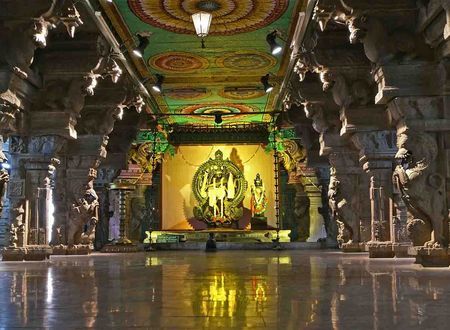Ambition usually refers to a burning desire within an individual to reach somewhere or attain something. The desire is burning. Ego refers to that part of mind that is concerned with experiences that selfishly promotes individual gratification needs vis-à-vis rest of the world. Both are concerned with the individual need and are thus strongly connected.
No sooner does each human being attain the age to read own mind functions, they notice that the mind exists often with conflicting thoughts. The conflict wherever (or in whomsoever) noticed arises due to the presence of the ego mind. In all humans, there is this voice within (often feeble) that seeks unity and a binding relation with others. This human tendency of mind can be likened to the drop of water seeking to flow towards the ocean and get united and whole. The ego-mind is not able to comprehend this since by its very design, ego is the sense of separateness with the whole. Now there is a power inherent in all forms of existence – the ego mind wishes to ensure that this power is completely owned by the individual self. Mind is hence always in a state of conflict as it oscillates between moments of wanting togetherness (and thus sharing power with others) and moments of wanting power entirely for the individual self. This is the root cause of all human power struggles whether small or large.
The individual ambition usually focusses on a small aspect of the power and visualizes that power for self. It is obviously ego-driven. Yet it is not the complete story! Desire by itself is never a burning desire in the first instance. At the root, even desire is just a thought. Average humans is known to have 60,000 thoughts in a single day. Not every thought becomes a desire. Some becomes a desire due to several agents in play. The players or agents leading to the thought becoming a desire could be
1. The inner attraction (individual trait);
2. The surrounding influences like family, friends, workplace, society, country etc.
3. The era one exists in or environment in general.
Any or all agents conspire to ensure that certain specific thoughts (out of 60,000) become etched in your mind-memory as a fleeting desire. The memory still holds it as a fleeting desire that has limited charge to inspire action. Now for this fleeting desire to become a burning desire, it will need either a very strong catalyst or a continued charging. By continued charging, I refer to either the constant barrage of cues from the surrounding or internal mental repetitions of the same thought to turn the fleeting desire into a burning desire. Catalyst may refer to a sudden and strong impact on the mind – for eg: death of close one or sudden learning of a heart-wrenching news. This is when the desire becomes a burning one- an ambition! Is it fuelled by the ego-mind? Not initially- yet once the ambition has set in, the ego mind refuses to let anything come in the way of fulfilment of this desire. That is because this desire is now burning. The ego-mind cannot release hold or loosen-up unless the fire simmers.
When ego-mind refuses to loosen up, all other memories of the individual (fleeting desires) that is contrary to the desire or is viewed as a threat to the fulfilment of the desire is suppressed with a superhuman power. “Super-human” because the fire inside is volatile and violent allowing nothing contrary to exist. It is by nature destructive. Ambition by itself is neither good nor bad. However, the ambition causes destruction in the name of fulfilment of a core desire, the effect of which is sensed only when the fire simmers and calms down.
Let us look at two example scenarios. The first example is of a small kid with burning ambition to be the only topper of the school. Ignoring the reasons that makes him ambitious, we focus our attention on the effect of this ambition. Due to the ambition, usually, the kid manages to be topper most of time getting waylaid occasionally. Yet this ambition destroys the kid’s ability to interact peacefully with other kids whom the ego-mind views as a threat for the top position. It destroys the kid’s ability to enjoy other activities in school as it starts viewing every activity from a narrow standpoint of being a topper. It is only when the kid grows up and the raging fire of desire within calms, that the kid who could be grown up by then begins to view interactions with others as important for a richer experience.
Let’s take a peep into the second example for ambition – an unusual one, that of Prince Siddharth. Prince Siddharth is brought up to live a lavish life lacking none of the material pleasures. Suddenly thanks to a catalyst, Prince Siddharth gets a burning ambition – “to know the ultimate truth”. This fiery desire makes him give up everything that he possessed. In it’s own way, it is a destructive ambition that urges Siddharth to break up all known relations in search of an eternal truth. His ambition is fuelled by ego-mind that refuses to allow any other fleeting desires (like wife or parents etc) to create contrary thought process that can derail him from his search. And that ambition finally made him the “Buddha”. The kid and Siddharth both had ambition. Ambition in both cases destroyed relations. Yet once the fire calms down, both individuals end up realising that relations with others are important. Buddha may claim it is important because he has finally realised that we are all one single being while the kid may still be in the dark (and having mind-conflicts) wondering why relations are important (especially when it is painful), however the tendency of the non-ego mind will always make one sway towards merging with all. Whatever the individual dharma may dictate, the dharma of family supersedes it. Whatever the family dharma dictates, the dharma of society supersedes it and finally whatever the society may dictate, the dharma of universe will supersede. This is how the universe continues to function. All human actions need a motive. Ambition provides a strong motive and that is the good aspect of ambition. Indeed, in many instances it is the ambition of one person that powers and sways all members of that country to act in a particular manner. Yet, ambition also causes the ego-mind to either temporarily blind oneself from seeing a whole truth or look at truth from a extremely narrow perspective. Only when one’s ambition itself is “truth”, that one automatically starts to realign just like Buddha did.
The ego-mind governing an individual self may fret on unfulfilled desires, worry about survival and fear destruction, but the whole has no such fear. It is neither created nor destroyed, it just exists and witnesses. Ambition or no ambition – it is all a play- “Leela” or “Maya”! Even if one person is not ambitious, he or she may get dragged into doing a certain set of actions due to the ambition of another or external forces depending on the era.









Comments & Discussion
0 COMMENTS
Please login to read members' comments and participate in the discussion.